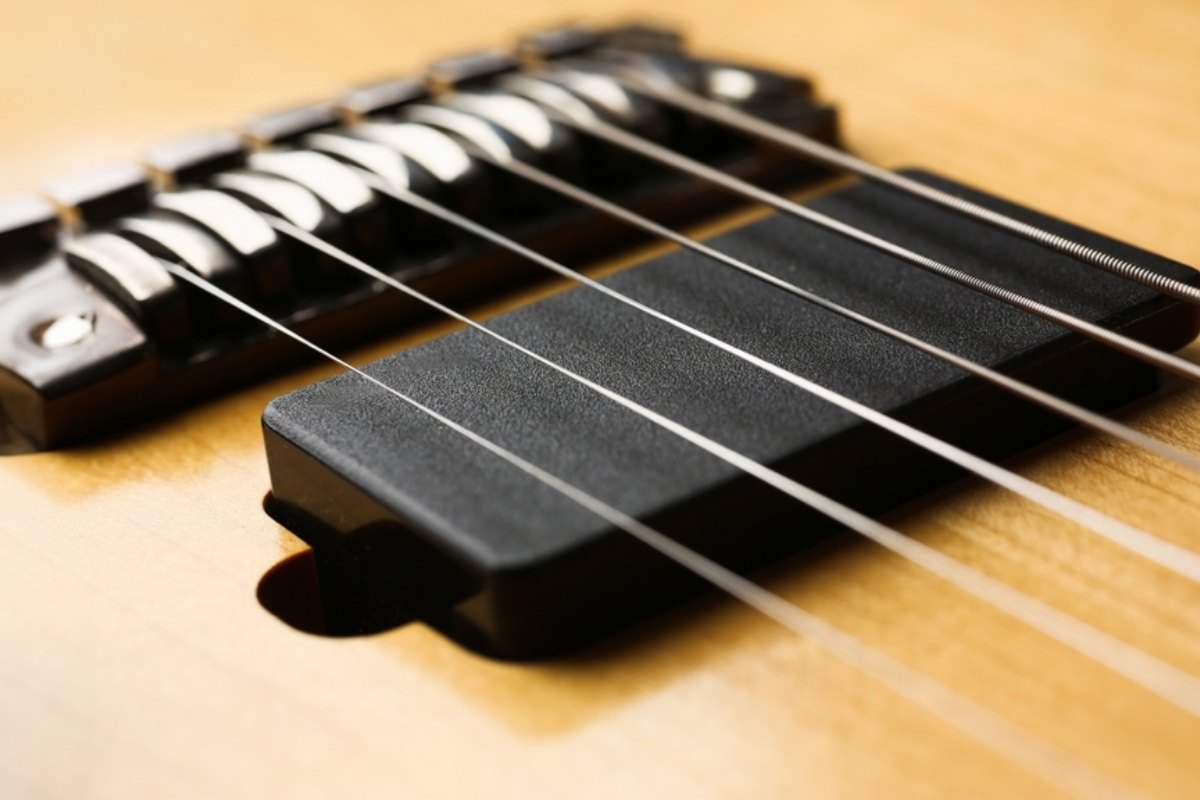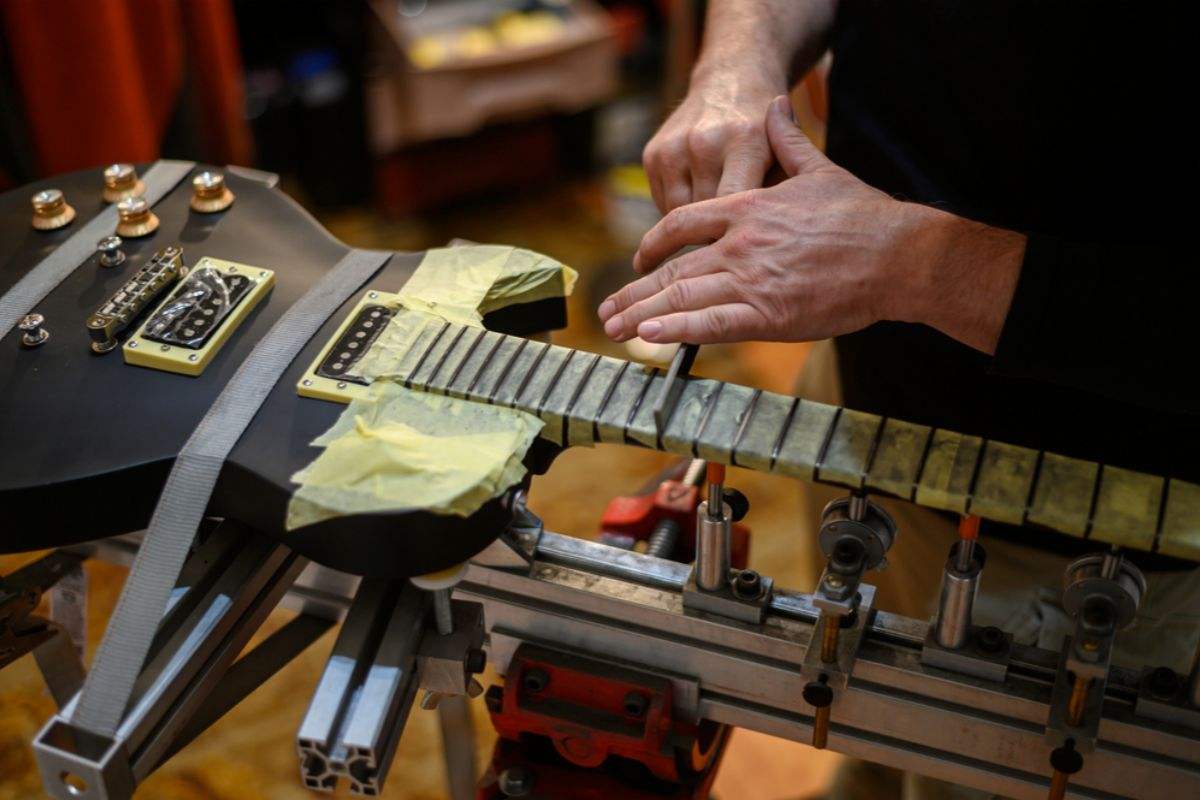Have you ever dreamt of building your own guitar? The majority of us have and it’s a highly rewarding experience for any guitarist as long as you have some basic DIY and woodworking skills. However starting a new highly-skilled hobby, especially one that requires precision, creativity, and a variety of skills can be overwhelming.
So, I’ve decided to share a few tips to get you going with confidence on your journey to guitar building heaven. Let’s start with…
The Basics
Before you start to build or repair an instrument, you need to understand the basic principles of guitar construction. So, carefully consider all the components and what effect they have on the tone the guitar produces.
You’ll also need to learn about the various wood types as well as the other materials used to create guitars, plus the basics of sound production.
Small Steps First
Don’t start by trying to create that dream 3-necked (6-string, 12-string, and 8-string mandolin) guitar you’ve always wanted, that will simply look and sound amazing. Far better to go for a simple kit guitar project or a basic repair of one of your guitars or one that belongs to a friend (who really trusts you!).
Guitar kits usually include a pre-cut body and neck, the necessary hardware, plus detailed instructions. They are far simpler to build than a complete instrument and let you concentrate on assembling and finishing, as opposed to spending weeks trying to create a perfect neck from scratch.
Even a simple build or repair will improve your skills and let you find out if you enjoy the process or not. As you get more confident and gain more experience, you can get more adventurous with more complex builds.
Education is Key
You can never know too much, so check out online resources, such as video tutorials on platforms such as YouTube, guitar-building forums, luthier communities, as well as books on the subject. There is so much incredibly useful, free information out there, it’s usually just a case of a quick search to find out how to do most lutherie tasks.
It’s also worth finding out if there are any local classes in Community colleges, Further Education colleges, or other establishments in your area. Or, you could go for an intensive course, such as for a week or 10 days further afield.
If you are considering guitar building as a full-time career, there are accredited University and college courses up to a 3-year BA (Hons) degree level in certain countries.
Another excellent way to learn the art of Lutherie is to get yourself an experienced luthier as a mentor. They will be there when you need them, to answer questions and help you when you run into problems, plus you can offer to help them for free occasionally to get yourself some high-quality on-the-job experience.
Learning from mentors who are masters of the craft will save you a lot of frustration, beginner mistakes, and head scratching, ensuring better and more consistent results.
The 3 P’s - Patience, Practice, and Precision
Creating quality guitars isn’t easy and you’ll need to be patient and detail orientated. Each and every step needs to be carefully considered to ensure that the guitar is as good as it can possibly be.
Don't rush the process, take things slowly and concentrate on completing every task to the very best of your ability. Making a mistake will more than likely cost you time and money, so don’t rush, a slow and steady workflow will produce far better quality instruments.
When things aren’t going to plan, don’t get discouraged, step back, take a deep breath, work out what’s wrong, and then move on to complete the job properly.
Quality Comes at a Cost, but It’s Worth It
As with every craftsman, you’ll need the right tools for the job. But every guitar build will require a slightly different set of tools so there is no need to buy every tool you could possibly need straight away. It’s best to build your tool collection slowly, starting with the basics, and then adding the rest as and when you need them.
Quality tools are well worth the investment, they will give you far better results and last longer. However, you might not be in a position to spend a fortune on tools, if money is a little tighter, don’t worry, buy the best tools you can afford.
You’ll also need to learn how to maintain and sharpen them, a sharp mid-price chisel, is far more effective than a blunt expensive one.
If you’re not sure what tools you’re going to need, then check out A Beginners Guide to Lutheir Tools.
The Perfect Guitar Creation Workspace
A well-organized, dedicated (in an ideal world) workspace will give you the best results. This should include a sturdy workbench with good lighting, with shelves and/or cabinets to store tools, materials, and products.
Concentrate on the Sound and Playability
You’ll obviously want your creations to look great, but making an instrument that sounds good and is enjoyable to play is even more important.
Therefore, take some time to evaluate any material or technique and its effect on the tone of the instrument. So experiment to find out how these different factors such as the type of bracing, neck angle, and wood choice impact the sound and playability.
It’s also worth giving an instrument to your guitar-playing friends for a few days to find out what they think of them.
Keep Up with the Latest Developments
New techniques, materials, and designs are constantly emerging. So keep up to date by watching the latest online videos, and reading any newly released books related to guitar making.
It may also be worth joining luthier associations and visiting any trade shows in your area to network with other guitar builders and find the latest trends. You can also study historical instruments, classic as well as contemporary designs, and other luthier builds to spark your creativity.
Welcome and Learn from your Mistakes
Don’t get discouraged when you make a mistake, it is actually an opportunity to learn something and to improve your knowledge and skillsets. Asking yourself questions such as ‘What went wrong?’ and ‘How can I make sure that doesn’t happen again?’ will make you a far better guitar builder.
Wrapping it Up
Building a beautiful instrument that sounds great and is a pleasure to play is not only about the finished product, but the enjoyable journey that you took to create it. So, enjoy the process and celebrate each and every achievement, regardless of how small it is.
Getting to the end of a guitar build, after weeks or months of hard work, playing it for the first time and hearing the sound it makes, is one of the great pleasures for any guitarist. So, what’s stopping you? Nothing, go for it and create that dream guitar you’ve always wanted.
If you like this article, please share it!
Be sure to join our FB Group Guyker Guitar Parts & Accessories Community to share your ideas! You can also have connections with like-minded guitar players, Guyker updates as well as discounts information from our FB Group.





